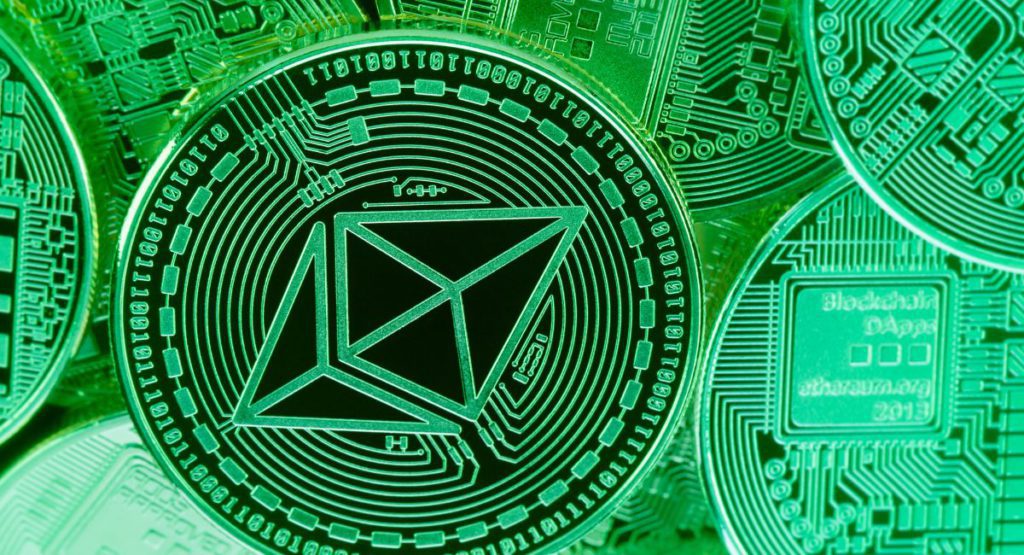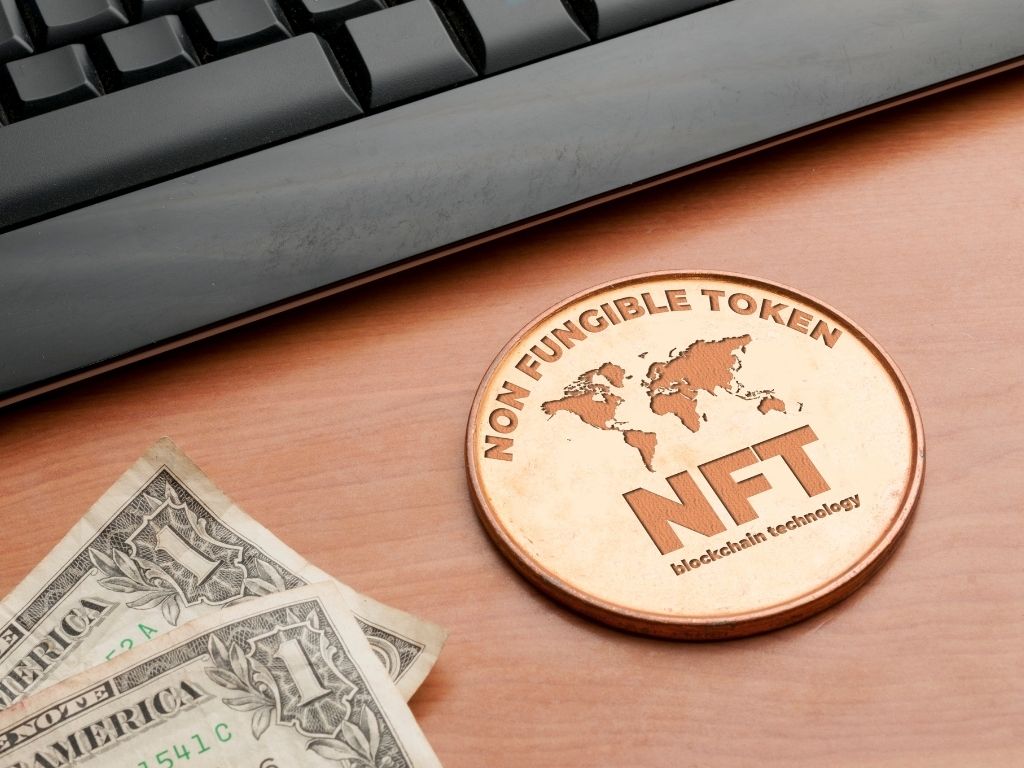Top 10 Metaverse Cryptocurrencies That Are Highly Volatile In Crypto Market

10 Metaverse cryptocurrencies that are highly volatile:
1. Ethereum (ETH)

Ethereum is the indisputable leader in the metaverse revolution. Its smart contract capabilities and decentralized applications (DApps) have paved the way for countless metaverse projects. Ethereum’s transition to Ethereum 2.0 with its proof-of-stake (PoS) consensus mechanism addresses scalability and environmental concerns, positioning it as a robust metaverse infrastructure.
2. Decentraland (MANA)

Decentraland is a virtual world built on Ethereum where users can buy, sell, and build on parcels of digital real estate. It has demonstrated the potential of blockchain in creating virtual environments and fostering a virtual real estate market. MANA is used for transactions within Decentraland, and its value is intrinsically tied to the metaverse’s growth.
3. Axie Infinity (AXS)

Axie Infinity has revolutionized play-to-earn gaming in the metaverse. Players earn AXS tokens by participating in battles and other in-game activities. This innovative economic model has attracted significant attention and investment, showcasing the potential for cryptocurrencies in metaverse gaming.
4. The Sandbox (SAND)

The Sandbox is a user-generated content platform that allows users to create, own, and monetize their gaming experiences within a virtual world. SAND is the native utility token, used for transactions, governance, and NFT creation. It’s positioned as a cornerstone of the emerging metaverse.
5. Gala (GALA)
Gala Games has made waves in the metaverse by offering a platform where users can create, play, and earn within virtual worlds. Gala (GALA) is the native cryptocurrency that powers the ecosystem, and it’s utilized in various in-game activities and NFT transactions.
6. Enjin Coin (ENJ)

Enjin Coin is known for its integration of non-fungible tokens (NFTs) in the gaming world. It provides developers with tools to create blockchain-based assets and integrate them into games and virtual worlds. As the metaverse flourishes, ENJ’s role in facilitating NFT transactions becomes increasingly significant.
7. Flow (FLOW)
Flow has become a metaverse powerhouse, powering projects like NBA Top Shot and CryptoKitties. Its unique approach to blockchain scalability, combined with its user-friendly developer tools, positions it as a top choice for metaverse creators and users.
8. Crypto.com Coin (CRO)
Crypto.com, a popular cryptocurrency platform, has been actively investing in metaverse projects and infrastructure. The CRO token plays a vital role in the ecosystem, facilitating transactions, staking, and governance within the platform.
The SEC will likely sue Crypto .com
they sued Coinbase and Binance for selling securities
specifically naming Solana, Cardano, Sandbox, Matic, CHZ, BNB, Mana, Algo and more
crypto .com also sells ALL of these cryptos
plus they launched their own CRO coin
plus they offer… pic.twitter.com/2nuqd5ljVY— Crypto Tea (@CryptoTea_) June 8, 2023
9. Algorand (ALGO)
Algorand’s commitment to sustainability and scalability makes it a strong contender in the metaverse revolution. Its efficient consensus mechanism and low transaction costs align with the growing demand for blockchain technology in the virtual world.
10. Binance Coin (BNB)

Binance Coin, the native cryptocurrency of the Binance ecosystem, has been actively involved in supporting NFT marketplaces and metaverse projects. Its broad adoption and utility within the Binance ecosystem make it an attractive option for users and developers looking to engage with the metaverse.
These metaverse cryptocurrencies represent a diverse range of projects, from virtual land ownership to in-game assets and decentralized marketplaces. They are challenging Bitcoin by offering unique use cases tailored to the growing metaverse industry, which is expanding rapidly and attracting attention from investors, gamers, and developers worldwide. However, it’s essential to conduct thorough research and stay updated on the cryptocurrency market, as it can be highly speculative and volatile.
Effect of these Metaverse cryptocurrencies on Bitcoin
- Diversification of the Cryptocurrency Market: Metaverse tokens represent a diversification of the cryptocurrency market. They introduce new use cases and applications beyond what Bitcoin offers. This diversification can attract more participants to the cryptocurrency space, indirectly benefiting Bitcoin by increasing overall market interest and adoption.
- Competition for Investment: As metaverse tokens gain prominence and attention, they may compete with Bitcoin for investment. Investors seeking exposure to the metaverse may allocate funds away from Bitcoin and into metaverse projects. This competition for investment can lead to fluctuations in Bitcoin’s market dominance.
- Increased Attention to the Blockchain Ecosystem: The rise of metaverse cryptocurrencies draws attention to the broader blockchain ecosystem. People exploring metaverse projects may gain a better understanding of blockchain technology and its potential applications. This heightened awareness can indirectly benefit Bitcoin by fostering a more informed and receptive audience.
- Interoperability and Integration: Some metaverse projects rely on or integrate with Bitcoin. For example, Layer 2 scaling solutions like the Lightning Network enable faster and cheaper Bitcoin transactions, which could be used in metaverse applications. Such integrations can enhance Bitcoin’s utility and value within the metaverse.
- Innovation and Evolution: Metaverse cryptocurrencies often pioneer innovative technologies and applications. These innovations can influence the broader blockchain and cryptocurrency space, including Bitcoin. New consensus mechanisms, scalability solutions, and governance models developed in the metaverse could inspire advancements in Bitcoin and the overall crypto ecosystem.
- Market Correlation: The performance of metaverse tokens and Bitcoin can become correlated, especially during times of market volatility. When metaverse projects experience significant price movements, it can influence market sentiment, affecting Bitcoin’s price. This interconnection is observed in the crypto market as a whole.
- Speculative Behavior: Speculative trading and investment behavior can drive both metaverse tokens and Bitcoin. As investors chase opportunities for quick gains in metaverse projects, they may also allocate funds to Bitcoin as a more stable and established asset, contributing to Bitcoin’s liquidity and value.
- Regulatory Developments: Regulatory decisions and policies regarding metaverse tokens can indirectly affect Bitcoin. If governments introduce regulations that impact metaverse projects, it may set precedents or influence approaches taken toward cryptocurrencies in general, including Bitcoin.
In summary, metaverse cryptocurrencies are part of the broader cryptocurrency ecosystem, and their impact on Bitcoin is intertwined with the evolving dynamics of the market. While they may compete for investment and attention, they can also introduce new users to the blockchain space and foster innovation that benefits Bitcoin and the entire crypto industry. Bitcoin’s resilience and established position make it a foundational asset, but its relationship with metaverse tokens is likely to continue evolving as the metaverse gains prominence in the digital world.
Why metaverse cryptocurrencies are the future of the stock market?
Metaverse cryptos, although distinct from traditional stock market investments, are gaining attention as a potential evolution of the financial and asset markets. Here are some reasons why some consider metaverse cryptos as the future of the stock market:
- Digital Ownership and Interoperability: Metaverse tokens often represent ownership of digital assets, including virtual real estate, in-game items, and digital collectibles. These assets can be traded and used across different metaverse platforms. This interoperability and digital ownership are akin to stocks or assets in the real world.
- Decentralized Ownership and Governance: Metaverse projects frequently operate on decentralized blockchain networks, and their governance is often determined by token holders. This decentralized ownership model aligns with the principles of decentralization found in cryptocurrencies and blockchain technology.
- Income-Generating Assets: In the metaverse, users can generate income by participating in activities, such as gaming, creating content, or owning virtual properties. Some metaverse tokens represent a share of the revenue generated in these virtual economies, making them functionally similar to dividend-yielding stocks.
- New Investment Opportunities: Metaverse projects are creating new opportunities for investment, enabling individuals to diversify their portfolios beyond traditional assets like stocks and bonds. These investments have the potential for substantial returns as the metaverse continues to grow.
- Global Accessibility: Metaverse assets are accessible to anyone with an internet connection, providing a level of global access that traditional stock markets may not offer. This democratization of investment opportunities can empower a more inclusive and diverse group of investors.
- NFTs and Digital Collectibles: Non-fungible tokens (NFTs), a key component of the metaverse, have demonstrated the value of digital collectibles. Some NFTs represent ownership of unique, scarce digital assets, which can appreciate in value similarly to collectible items or art.
- Metaverse as a New Economy: The metaverse is evolving into a digital economy with its own rules and opportunities. As these virtual economies grow, they offer new avenues for investments and financial participation, similar to how stock markets are central to the real-world economy.
- Speculation and Growth Potential: Speculative behavior and the potential for rapid growth in the metaverse market can attract investors seeking high returns. While this speculative aspect carries risks, it also fuels interest and investment.
It’s important to note that while metaverse tokens offer new investment opportunities, they also come with unique risks and uncertainties. The metaverse market is still relatively young and evolving, and regulations in this space are not yet fully developed. Investors should conduct thorough research, exercise caution, and consider their risk tolerance when participating in metaverse investments.
While metaverse cryptos have the potential to be a part of the future financial landscape, they do not replace traditional stock markets but complement them, offering a novel and dynamic dimension to investment opportunities.



























































